Cracked games are like that sketchy guy in a trench coat offering “free” Rolex watches in a dark alley. Sure, the price is right, but what’s the catch? Millions of gamers download pirated software daily, thinking they’re getting a sweet deal. The reality? They’re walking into a cybercriminal’s paradise where their computers become unwitting servants in a digital underworld.
- Threat Summary
- The Art of Digital Deception: How Game Cracking Really Works
- The 5 Digital Nightmares Hiding in Your “Free” Games
- When the Law Comes Knocking
- The Hidden Performance Tax
- The Criminal Business Model
- The Smart Gamer’s Guide to Safe Gaming
- When Your Gaming Rig Becomes a Crime Scene
- Your Burning Questions About Cracked Games
- The Real Cost of “Free” Gaming
- The Future of Gaming Security
- The Bottom Line
Threat Summary
| Threat Type | Malware Distribution Vector / Software Piracy |
| Primary Risks | Malware infection, data theft, legal consequences, system compromise |
| Common Payloads | Trojans, ransomware, crypto miners, adware, spyware, backdoors |
| Distribution Methods | Torrent sites, file-sharing platforms, piracy forums, fake game sites |
| Risk Level | Very High – Multiple severe security and legal risks |
The Art of Digital Deception: How Game Cracking Really Works
Picture this: every legitimate game is like a nightclub with a bouncer checking IDs at the door. The bouncer (license verification) makes sure only paying customers get in. Now imagine a skilled locksmith who can create a fake ID so convincing that the bouncer waves you right through. That’s essentially what game crackers do.
They locate the “bouncer code” in the software and create a digital bypass that makes the game think, “Oh, this person definitely paid for me!” The technical term is software cracking, but the street name is “digital counterfeiting.”
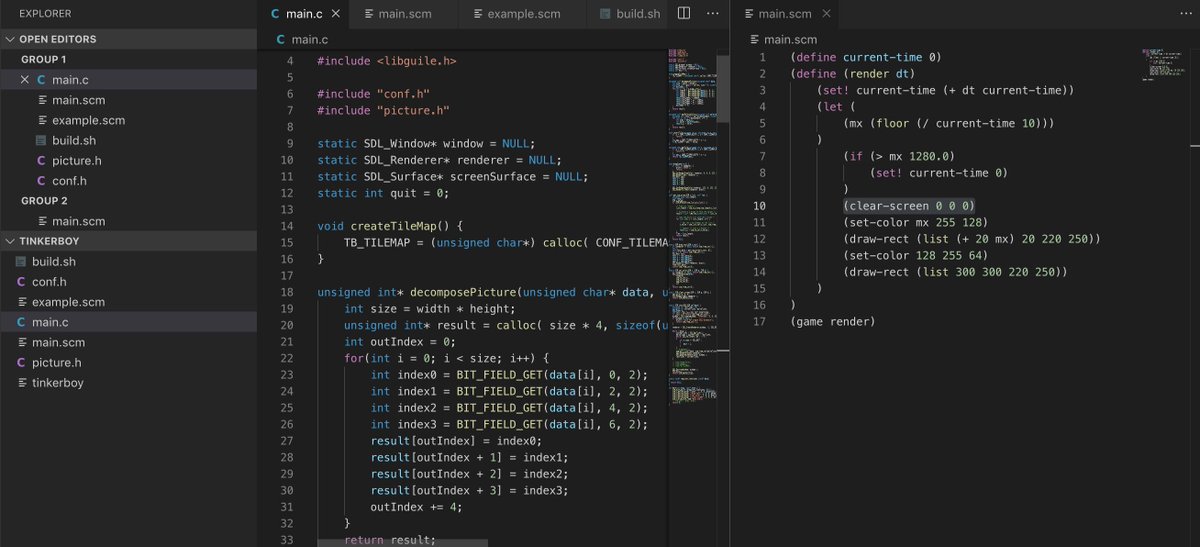
Here’s where it gets interesting: crackers aren’t digital Robin Hoods. They’re businesspeople with bills to pay and profits to make. The “free” game is just the bait in a much larger trap.
The 5 Digital Nightmares Hiding in Your “Free” Games
1. Your Computer Becomes a Malware Buffet
Remember that friend who invited you over for dinner but served you food poisoning? Cracked games work the same way. You think you’re getting Cyberpunk 2077, but you’re actually downloading a digital disease cocktail.
Take the infamous case where HackTool infections spread through popular game cracks. Users thought they were downloading the latest AAA title, but instead got front-row seats to watching their bank accounts get drained. The malware didn’t just steal gaming credentials – it went after everything: banking passwords, social media accounts, even those embarrassing photos you thought were safely hidden.
Modern cracked games are like Russian nesting dolls, but instead of cute wooden figures, each layer reveals a new digital nightmare. First comes the trojan that steals your passwords, then the ransomware that locks your files, followed by the cryptocurrency miner that turns your gaming rig into a profit machine for criminals. It’s a full-service criminal operation disguised as entertainment.
Security researchers have documented how cybercriminals use pirated software to deliver backdoors and ransomware, turning what should be fun gaming sessions into expensive lessons in cybersecurity.
2. The Silent Bitcoin Thief Living in Your CPU
Imagine coming home to find someone has been secretly using your electricity to run their business, leaving you with a massive power bill. That’s exactly what happens with crypto miners hidden in cracks and keygens.
One gamer shared his story online: “I downloaded a cracked version of a racing game and suddenly my computer sounded like a jet engine. My electricity bill doubled, and my graphics card died within three months. Turns out, I was mining Bitcoin for some criminal in Eastern Europe while I slept.”
The cruel irony? While you’re struggling with lag and overheating during your gaming sessions, thinking your hardware is just getting old, someone halfway across the world is literally making money off your suffering. Your expensive gaming setup becomes their personal money-printing machine, and you get to pay the electricity bills.
These mining programs are sneaky. They’ll throttle down when you’re actively using your computer to avoid detection, then ramp up to full power when you step away. It’s like having a polite burglar who waits for you to leave before robbing you blind.
3. The Digital Pickpocket in Your Hard Drive
Here’s a scary bedtime story: Sarah downloaded a cracked version of The Sims because she didn’t want to pay for expansion packs. Three weeks later, she got a call from her bank about suspicious charges in three different countries. The information stealing malware had been quietly photographing her screen every time she logged into anything important.
These digital pickpockets don’t just grab your wallet – they photocopy your entire life. Banking credentials, social media passwords, those private messages you’d rather forget, family photos, work documents, and even your saved game progress (because apparently criminals have no shame).
The stolen data doesn’t just disappear into the void. It gets sold on dark web marketplaces like items at a garage sale. Your Netflix password might go for $2, but your banking credentials could fetch $200 or more. Meanwhile, you’re wondering why your Instagram account is suddenly posting ads for questionable pharmaceutical products.
4. The Invisible Puppet Master
Backdoor trojans are like giving a stranger the keys to your house, your car, and your office – except they’re invisible and you don’t even know they exist. Once installed, these programs turn your computer into a remote-controlled zombie in a criminal botnet.
One security researcher described it perfectly: “It’s like having a criminal living in your attic who can see everything you do, use your internet connection for illegal activities, and invite their friends over whenever they want. Except the attic is your computer, and the criminal is halfway around the world.”
The truly disturbing part? Your computer might be participating in cyberattacks against hospitals, schools, or government agencies while you’re innocently playing games. You become an unwitting accomplice in digital crimes you never knew were happening.
5. The Annoying Roommates Who Won’t Leave
Even when cracked games don’t contain “serious” malware, they’re often packed with digital freeloaders that make your computing experience miserable. Think of them as that annoying roommate who eats your food, doesn’t pay rent, and brings over friends who trash the place.
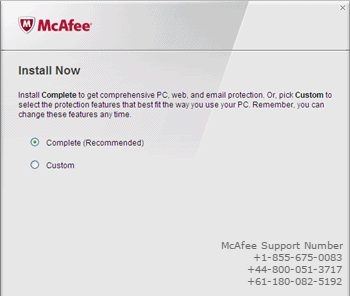
These potentially unwanted programs include fake antivirus software that screams about imaginary threats (classic scareware applications), browser hijackers that redirect your searches to sketchy websites, and “system optimizers” that somehow make your computer run worse than before they “helped.”
The frustrating part is that these programs are designed to be harder to remove than they were to install. They hide in system folders, create multiple registry entries, and sometimes reinstall themselves when you think you’ve finally gotten rid of them.
When the Law Comes Knocking
Let’s talk about the elephant in the room: using cracked games is illegal. Not “technically illegal” or “sort of illegal” – it’s straight-up copyright infringement that can land you in serious legal trouble.
For individual users, the risk varies by location, but don’t assume you’re safe just because you’re not selling pirated games. Some countries take copyright violation seriously enough to pursue individual users, especially if they’re sharing files through torrents.
But here’s where it gets really expensive: businesses that get caught using pirated software face financial penalties that make buying legitimate licenses look like pocket change. The Business Software Alliance loves making examples of companies, with settlements often reaching hundreds of thousands or even millions of dollars.
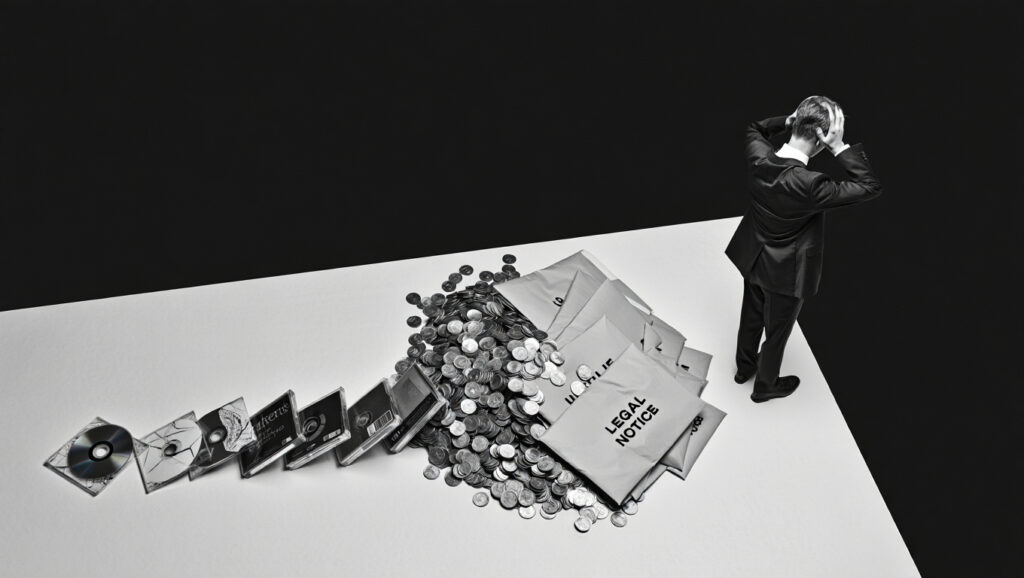
One small design firm got hit with a $180,000 settlement for using cracked copies of Adobe software worth about $2,000. The legal fees alone exceeded what they would have spent on legitimate licenses for the next decade.
The Hidden Performance Tax
Even if you ignore the security and legal risks, cracked games often perform worse than their legitimate counterparts. It’s like buying a sports car that’s been “modified” by someone who learned mechanics from YouTube videos.
The performance problems aren’t accidental. When your computer is secretly mining cryptocurrency, running multiple malware processes, and sending your data to criminal servers, it doesn’t have much processing power left for actually running games smoothly.
Users often blame their hardware or the game developers for poor performance, never realizing that the “free” game they downloaded is essentially running a criminal enterprise in the background.
The Criminal Business Model
Understanding why cracked games are so dangerous requires understanding the economics behind them. Crackers aren’t digital altruists – they’re entrepreneurs in the malware business.
The typical revenue model works like this: malware developers pay crackers a few dollars for every successful infection. A popular game crack that gets downloaded 100,000 times could generate $50,000 or more in pay-per-install revenue. Add cryptocurrency mining profits, stolen data sales, and botnet recruitment, and you’re looking at a very lucrative business model.
The “free” game is just the delivery mechanism. You’re not the customer – you’re the product being sold to cybercriminals.
The Smart Gamer’s Guide to Safe Gaming
The good news? You don’t need to choose between gaming and security. The modern gaming landscape offers incredible value for legitimate players.
Steam’s seasonal sales routinely offer 75-90% discounts on games. Epic Games Store gives away a free game every week – not cracked games, but legitimate titles from major publishers. Xbox Game Pass provides access to hundreds of games for the price of a fast-food meal.
Even if you’re on a tight budget, free-to-play games like Fortnite, League of Legends, and Counter-Strike offer hundreds of hours of entertainment without spending a dime. Many of these “free” games have better graphics and gameplay than expensive AAA titles from a few years ago.
For security-conscious gamers, the best practices are straightforward: download only from official stores, enable two-factor authentication on gaming accounts, keep your antivirus software updated, and resist the temptation of “too good to be true” deals from sketchy websites.
When Your Gaming Rig Becomes a Crime Scene
If you’ve previously downloaded cracked games, your computer might already be compromised. The signs aren’t always obvious – modern malware is designed to be stealthy.
Watch for subtle indicators: your computer running hot when you’re not gaming, unusual network activity, browser settings that keep changing back after you fix them, or new programs appearing that you didn’t install.
The cleanup process requires more than just deleting the cracked games. Malware often installs itself in multiple locations and can survive basic removal attempts. Professional security tools like GridinSoft Anti-Malware are specifically designed to detect and remove HackTool infections and other gaming-related malware.
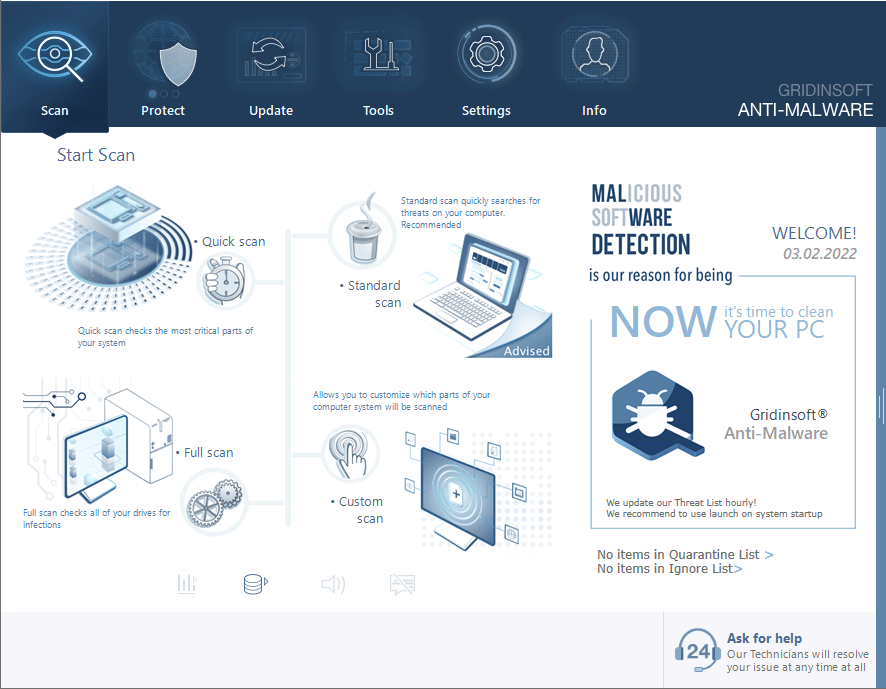
Download and install Anti-Malware by clicking the button below. After the installation, run a Full scan: this will check all the volumes present in the system, including hidden folders and system files. Scanning will take around 15 minutes.
After the scan, you will see the list of detected malicious and unwanted elements. It is possible to adjust the actions that the antimalware program does to each element: click "Advanced mode" and see the options in the drop-down menus. You can also see extended information about each detection - malware type, effects and potential source of infection.
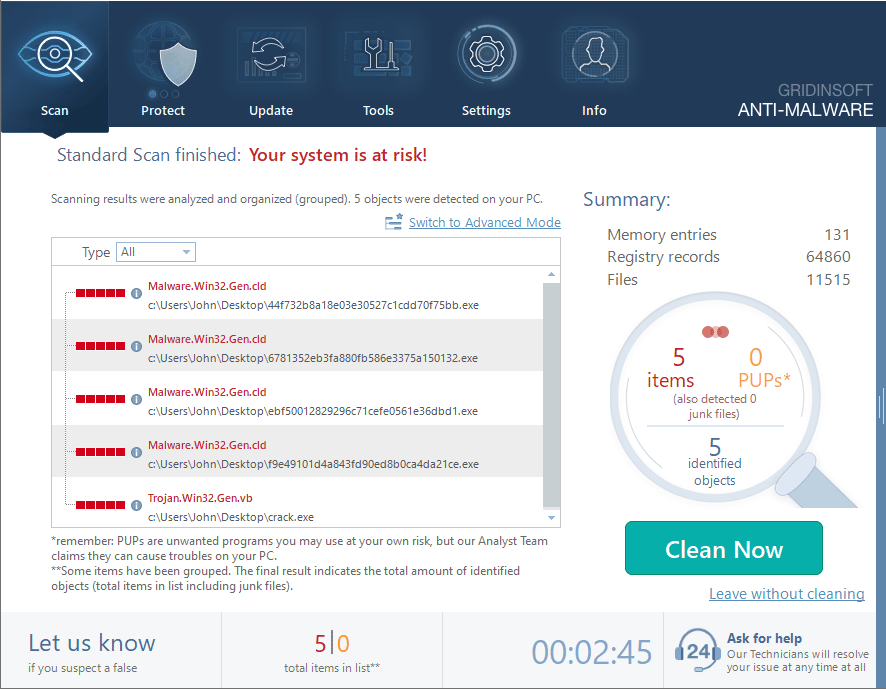
Click "Clean Now" to start the removal process. Important: removal process may take several minutes when there are a lot of detections. Do not interrupt this process, and you will get your system as clean as new.
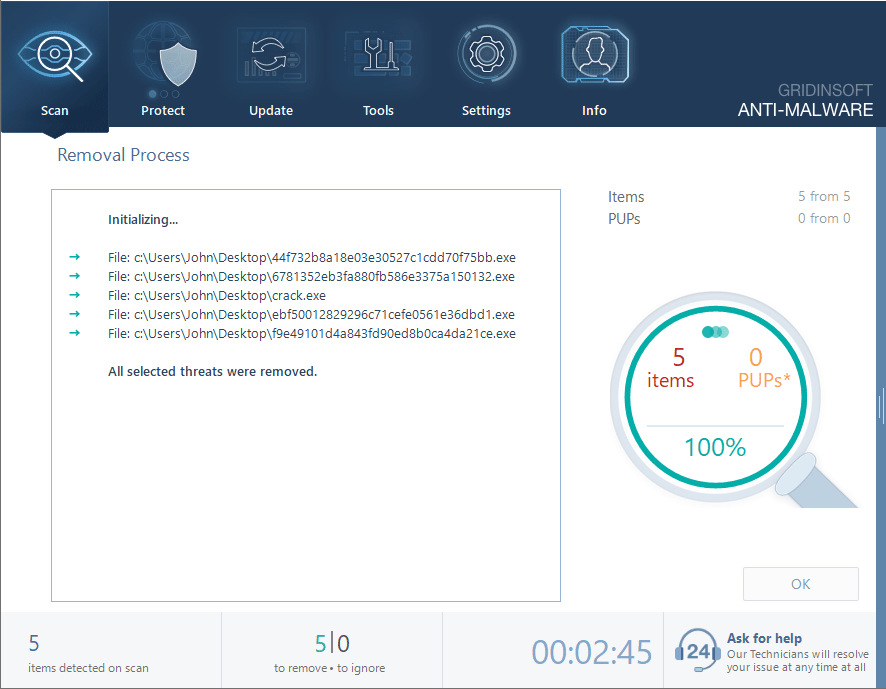
Your Burning Questions About Cracked Games
But seriously, are ALL cracked games infected?
Not technically, but asking this question is like asking if all loaded guns are dangerous. Even if a cracked game appears clean initially, there’s no way to verify its safety, and crackers have strong financial incentives to bundle malware. Plus, “clean” games can receive malicious updates later. The only winning move is not to play this particular game.
Can’t my antivirus protect me?
Your antivirus is like a bouncer at a club who’s been given a photo of known troublemakers. But what happens when the troublemaker gets plastic surgery or sends their identical twin? Crackers use advanced evasion techniques, and many users disable antivirus software when installing cracked games because security tools (correctly) flag them as threats.
I already installed some cracked games. Am I doomed?
Not doomed, but you need to act fast. Disconnect from the internet, uninstall all pirated software, run comprehensive malware scans, and change all your important passwords. Think of it as digital damage control – the sooner you act, the less damage the malware can do.
How do crackers actually make money from “free” games?
It’s a sophisticated criminal business model. They get paid per infection by malware developers, earn money from cryptocurrency mining using your computer, sell your stolen data on dark web markets, and recruit your machine for botnet operations. The “free” game is just the bait in a much larger criminal enterprise.
What about just downloading for “testing” purposes?
That’s like saying you’re only going to do drugs to see what they’re like. The malware doesn’t care about your intentions – it infects your system regardless. Most legitimate games offer demos, free weekends, or generous refund policies that make “testing” through piracy unnecessary and foolish.
Are there actually affordable legal alternatives?
Absolutely! Steam sales, Epic’s free weekly games, Xbox Game Pass, PlayStation Plus, Humble Bundle charity packages, and free-to-play titles offer incredible gaming value. Many gamers spend more on coffee in a month than they would on legitimate gaming through these services.
Can gaming malware really steal my Steam account?
Gaming accounts are prime targets because they’re valuable on black markets. Information stealing malware specifically hunts for gaming credentials, payment information, and valuable in-game items. A high-level account with rare items can sell for hundreds of dollars to other players.
How do I know if my computer is secretly mining cryptocurrency?
Your computer will act like it’s constantly running demanding software even when you’re just browsing the web. High CPU usage, overheating, loud fans, poor performance, and increased electricity bills are all red flags. Check Task Manager for suspicious processes consuming resources, and run security scans if anything looks fishy.
The Real Cost of “Free” Gaming
When you factor in the hidden costs of cracked games – system repairs, data recovery, identity theft remediation, increased electricity bills, hardware replacement, and potential legal fees – that “free” game becomes incredibly expensive.
Meanwhile, legitimate gaming has never offered better value. Modern gaming platforms provide security guarantees, automatic updates, cloud saves, customer support, and community features that enhance the gaming experience far beyond what any cracked game can offer.
The Future of Gaming Security
As gaming moves toward cloud-based platforms and streaming services, the traditional model of downloading and cracking games is becoming obsolete. Services like Google Stadia, Xbox Cloud Gaming, and NVIDIA GeForce Now run games on remote servers, making local piracy impossible.
This shift toward legitimate, service-based gaming is good news for players who want security, convenience, and fair prices without the risks associated with pirated software.
The Bottom Line
Cracked games represent one of the most dangerous cybersecurity threats facing modern computer users, disguised as harmless entertainment. The cybercriminal ecosystem behind game piracy has evolved into a sophisticated operation that exploits users’ desire for free software to build profitable criminal enterprises.
Every cracked game download is a potential entry point for dangerous malware trends that can compromise your personal data, financial information, and system security. The risks extend far beyond the individual user, potentially making your computer an unwitting participant in attacks against other victims.
The choice is ultimately yours, but the math is pretty simple: legitimate gaming offers better security, performance, and value than pirated alternatives. The temporary savings from cracked games pale in comparison to the long-term costs of malware infections, data theft, and legal consequences.
Your computer, your data, and your peace of mind are worth more than the price of a game. Choose wisely.

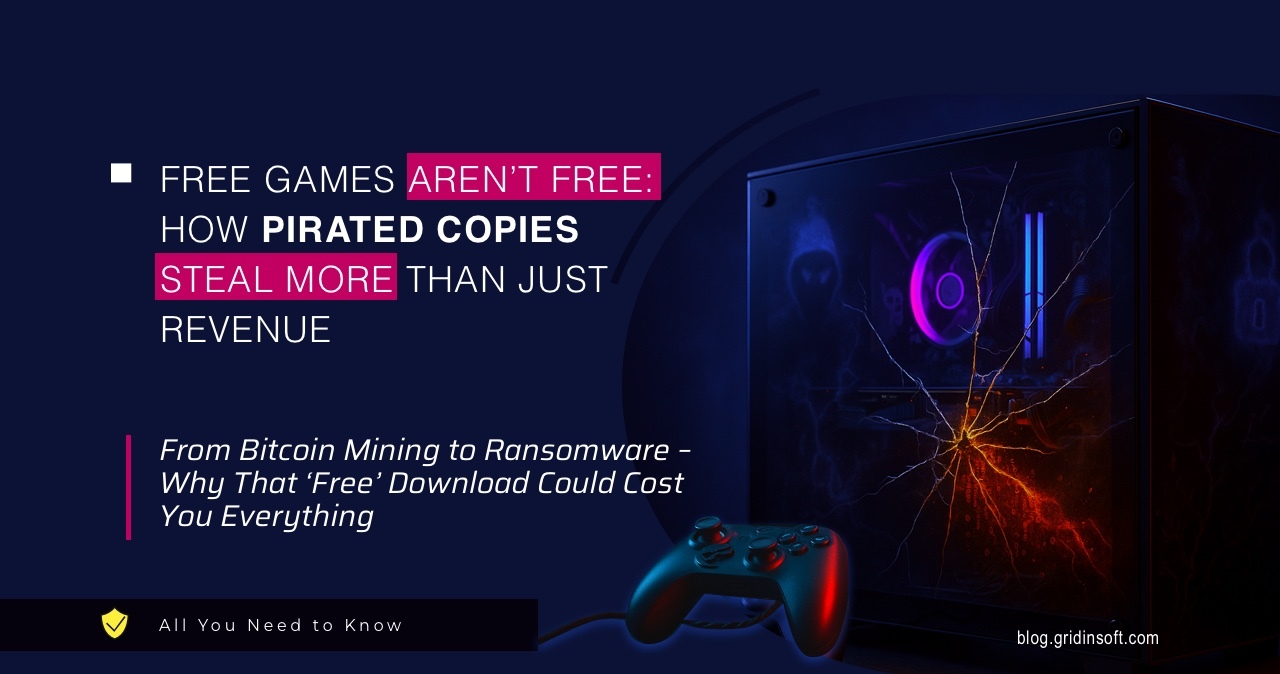


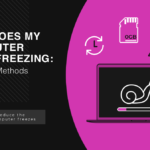

Very good post. I’m facing a few of these issues as well..
This is a good blog.